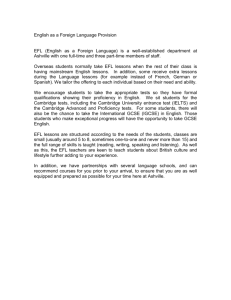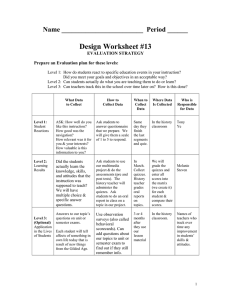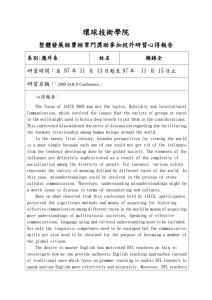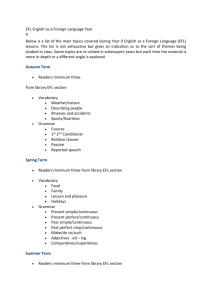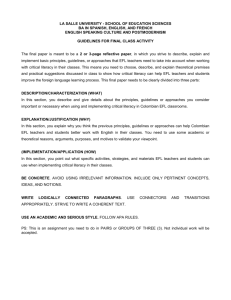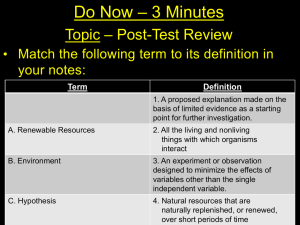Document 12716430
advertisement
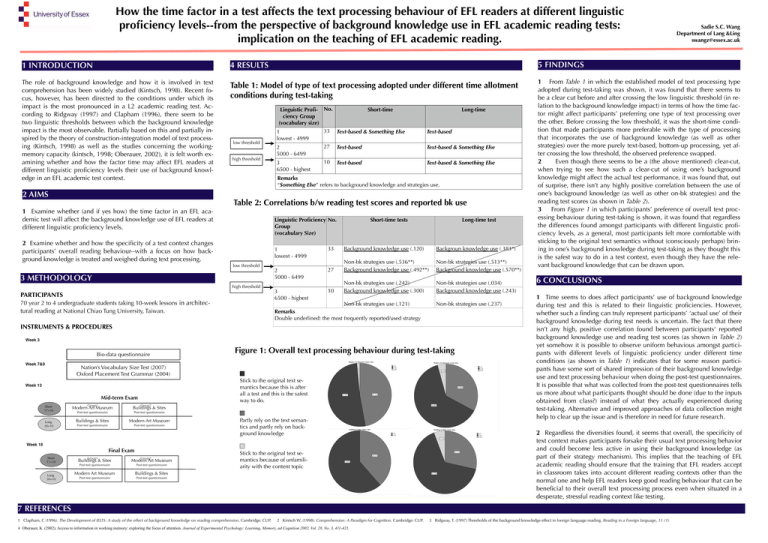
How the time factor in a test affects the text processing behaviour of EFL readers at different linguistic proficiency levels--from the perspective of background knowledge use in EFL academic reading tests: implication on the teaching of EFL academic reading. 1 INTRODUCTION The role of background knowledge and how it is involved in text comprehension has been widely studied (Kintsch, 1998). Recent focus, however, has been directed to the conditions under which its impact is the most pronounced in a L2 academic reading test. According to Ridgway (1997) and Clapham (1996), there seem to be two linguistic thresholds between which the background knowledge impact is the most observable. Partially based on this and partially inspired by the theory of construction-integration model of text processing (Kintsch, 1998) as well as the studies concerning the workingmemory capacity (kintsch, 1998; Oberauer, 2002), it is felt worth examining whether and how the factor time may affect EFL readers at different linguistic proficiency levels their use of background knowledge in an EFL academic test context. 2 AIMS 4 RESULTS 5 FINDINGS Table 1: Model of type of text processing adopted under different time allotment conditions during test-taking 1 From Table 1 in which the established model of text processing type adopted during test-taking was shown, it was found that there seems to be a clear cut before and after crossing the low linguistic threshold (in relation to the background knowledge impact) in terms of how the time factor might affect participants’ preferring one type of text processing over the other. Before crossing the low threshold, it was the short-time condition that made participants more preferable with the type of processing that incorporates the use of background knowledge (as well as other strategies) over the more purely text-based, bottom-up processing, yet after crossing the low threshold, the observed preference swapped. 2 Even though there seems to be a (the above mentioned) clear-cut, when trying to see how such a clear-cut of using one’s background knowledge might affect the actual test performance, it was found that, out of surprise, there isn’t any highly positive correlation between the use of one’s background knowledge (as well as other on-bk strategies) and the reading test scores (as shown in Table 2). 3 From Figure 1 in which participants’ preference of overall text processing behaviour during test-taking is shown, it was found that regardless the differences found amongst participants with different linguistic proficiency levels, as a general, most participants felt more comfortable with sticking to the original text semantics without (consciously perhaps) brining in one’s background knowledge during test-taking as they thought this is the safest way to do in a test context, even though they have the relevant background knowledge that can be drawn upon. low threshold high threshold Linguistic Profi- No. Short-time ciency Group (vocabulary size) 33 Text-based & Something Else 1 lowest - 4999 27 Text-based 2 5000 - 6499 10 Text-based 3 6500 - highest Long-time Text-based Text-based & Something Else Text-based & Something Else Remarks “Something Else” refers to background knowledge and strategies use. Table 2: Correlations b/w reading test scores and reported bk use 1 Examine whether (and if yes how) the time factor in an EFL academic test will affect the background knowledge use of EFL readers at different linguistic proficiency levels. Linguistic Proficiency No. Group (vocabulary Size) 2 Examine whether and how the specificity of a test context changes participants’ overall reading behaviour--with a focus on how background knowledge is treated and weighed during text processing. low threshold 3 METHODOLOGY high threshold PARTICIPANTS 70 year 2 to 4 undergraduate students taking 10-week lessons in architectural reading at National Chiao Tung University, Taiwan. Short-time tests Long-time test 1 lowest - 4999 33 Background knowledge use (.120) Backgroun knowledge use (.383*) 2 5000 - 6499 27 Non-bk strategies use (.536**) Background knowledge use (.492**) Non-bk strategies use (.513**) Background knowledge use (.570**) 3 6500 - highest 10 Non-bk strategies use (.242) Background knowledge use (.300) Non-bk strategies use (.034) Background knowledge use (.243) Non-bk strategies use (.121) Non-bk strategies use (.237) Remarks Double underlined: the most frequently reported/used strategy INSTRUMENTS & PROCEDURES Week 3 Bio-data questionnaire Week 7&9 Figure 1: Overall text processing behaviour during test-taking Nation’s Vocabulary Size Test (2007) Oxford Placement Test Grammar (2004) Week 13 Mid-term Exam Short 17+10 Long 30+10 Group1 Group2 Modern Art Museum Buildings & Sites Buildings & Sites Modern Art Museum Post-test questionnaire Post-test questionnaire Stick to the original text semantics because this is after all a test and this is the safest way to do. Post-test questionnaire Post-test questionnaire Partly rely on the text semantics and partly rely on background knowledge Week 18 Final Exam Short 17+10 Long 30+10 Group1 Group2 Buildings & Sites Modern Art Museum Modern Art Museum Buildings & Sites Post-test questionnaire Post-test questionnaire Post-test questionnaire Sadie S.C. Wang Department of Lang &Ling swangz@essex.ac.uk Stick to the original text semantics because of unfamiliarity with the content topic Post-test questionnaire 6 CONCLUSIONS 1 Time seems to does affect participants’ use of background knowledge during test and this is related to their linguistic proficiencies. However, whether such a finding can truly represent participants’ ‘actual use’ of their background knowledge during test needs is uncertain. The fact that there isn’t any high, positive correlation found between participants‘ reported background knowledge use and reading test scores (as shown in Table 2) yet somehow it is possible to observe uniform behavious amongst participants with different levels of linguistic proficiency under different time conditions (as shown in Table 1) indicates that for some reason participants have some sort of shared impression of their background knowledge use and text processing behaviour when doing the post-test questionnaires. It is possible that what was collected from the post-test questionnaires tells us more about what participants thought should be done (due to the inputs obtained from class?) instead of what they actually experienced during test-taking. Alternative and improved approaches of data collection might help to clear up the issue and is therefore in need for future research. 2 Regardless the diversities found, it seems that overall, the specificity of text context makes participants forsake their usual text processing behavior and could become less active in using their background knowledge (as part of their strategy mechanism). This implies that the teaching of EFL academic reading should ensure that the training that EFL readers accept in classroom takes into account different reading contexts other than the normal one and help EFL readers keep good reading behaviour that can be beneficial to their overall text processing process even when situated in a desperate, stressful reading context like testing. 7 REFERENCES 1 Clapham, C (1996). The Development of IELTS: A study of the effect of background knowledge on reading comprehension. Cambridge: CUP. 2 Kintsch W. (1998). Comprehension: A Paradigm for Cognition. Cambridge: CUP. 4 Oberauer, K. (2002). Access to information in working memory: exploring the focus of attention. Journal of Experimental Psychology: Learning, Memory, ad Cognition 2002, Vol. 28, No. 3, 411-421. 3 Ridgway, T. (1997) Thresholds of the background knowledge effect in foreign language reading. Reading in a Foreign language, 11 (1)
